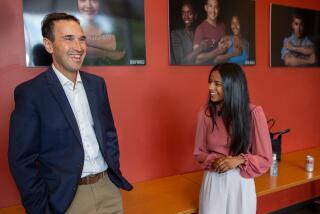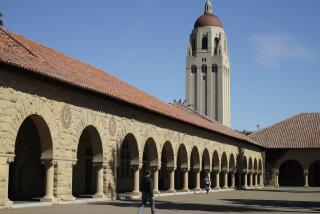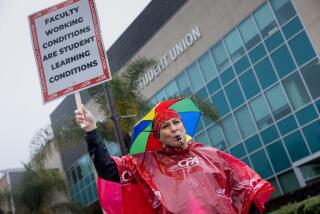Stanford faculty group votes to let ROTC return
Reporting from Palo Alto -- Stanford University’s Faculty Senate voted Thursday to invite the Reserve Officer Training Corps back to the campus for the first time since the Vietnam War era, a turnaround prompted by the end of the “don’t ask, don’t tell” policy against gays serving openly in the military.
Stanford’s President John L. Hennessy said he would soon start discussions with the military branches to return ROTC to the university, joining other elite schools in welcoming back the officer training units that had been pushed off campus or denied academic standing during the antiwar movement of the 1970s. Columbia University took similar steps last week, Harvard did so last month and several others are considering the actions.
Offering the military a bigger role on campus, Hennessy said after the vote, “would provide more opportunity for dialogue, and I think that dialogue is critically important in a democracy.” He said it was too early to say which ROTC units might reopen or how soon.
The Faculty Senate approved the change, 28 to 9 with three abstentions, after an emotional two-hour debate. Much of the discussion focused on the ban against transgender people serving in the armed forces, even after the congressional vote in December to lift the 17-year-old “don’t ask” rules that prevented gays from serving openly. Critics said allowing ROTC on campus would be discriminatory against transgender students.
About 40 Stanford students who opposed the program’s return demonstrated outside the meeting and yelled, “Shame on you,” as the faculty departed.
Among the protesters was sophomore Thomas Joseph, 20, of Portland, Ore., who said he opposed the American interventions in Iraq and Afghanistan and any Stanford involvement with the military. “I’m tired of it,” the chemical engineering student said of the wars, “and I’m not for a bigger military.”
The faculty vote came a week after a campus commission report that said ROTC’s return to Stanford would contribute to a better-educated officer corps, one more able to make judgments with “a high sense of moral principle and secure commitment to the rule of law.”
Commission Chairman Ewart Thomas, a psychology professor, told Thursday’s meeting that having ROTC on campus would bring more diverse points of view and trigger discussions about the military, history and leadership. “That’s something from which all our students would benefit,” he said.
Under ROTC, students receive scholarships in return for agreeing to military service after graduation. The Army, Navy and Air Force run separate programs for new officers.
Stanford has had a traumatic history with ROTC. In 1968, the Naval ROTC building on campus was destroyed in an arson fire. With antiwar sentiment high, the on-campus programs were phased out in the early 1970s, but the university later allowed students to take ROTC classes at other schools in the region. Fourteen Stanford students currently participate in the programs at UC Berkeley, San Jose State and Santa Clara University, but do not receive academic credit for them at Stanford.
The Stanford resolution approved Thursday would require close oversight by the university of ROTC courses as well as an effort to have the classes, which include military history and leadership training, open to all Stanford students, not just those in the program. Military and ROTC officials said they were unsure whether those issues could delay the program’s return.
Stanford law professor Lawrence Marshall said he struggled with his decision to vote yes. He said he believes that the military wrongly discriminates against transgender people but that having future military leaders meet such students on campus would eventually lead to the end of that policy. “The answer is exposure to diversity,” he said. Marshall proposed and won support for a faculty statement urging the military to change its transgender policy.
Earlier this month, a non-binding student election showed divisions, with 2,406 voting for ROTC’s return to Stanford, 929 opposing it and 2,117 abstaining. Some ROTC opponents had urged students to abstain.
More to Read
Start your day right
Sign up for Essential California for news, features and recommendations from the L.A. Times and beyond in your inbox six days a week.
You may occasionally receive promotional content from the Los Angeles Times.







